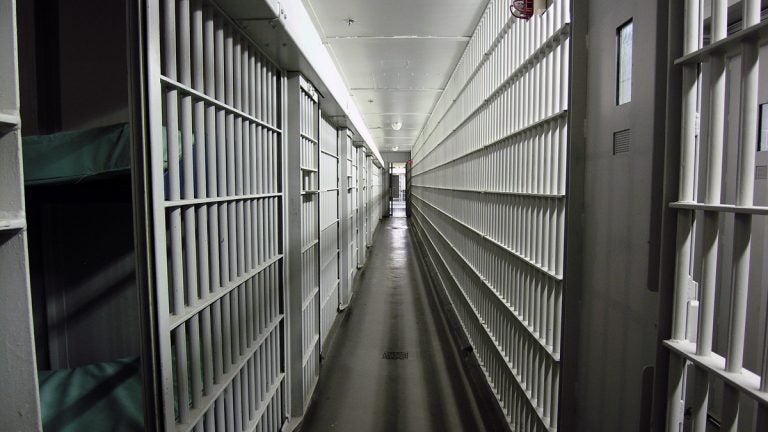N.J.’s Ballot Question No. 1 would fundamentally change who is eligible for bail

When New Jerseyans go to the polls tomorrow, they’ll have a chance to vote on two ballot questions — essentially, amendments to the state constitution.
The first question deals with changes as to who is eligible for bail in New Jersey. The second ballot question would set up what’s known as a “stable source of funding” to preserve open spaces, farmland, and historic sites.
(NJ Spotlight has written extensively on the latter issue, as recently as last week. Changes to the legal mechanisms governing bail are explored in detail in this article.)
The initial question on the New Jersey ballot, which would eliminate the constitutional right to bail for some offenses, is a lot more complicated than its simple statement indicates.
As written, the amendment’s purpose would be to allow those accused of certain offenses to be held without the ability to post bond. But those supporting the question, and that’s a whole host of groups that might not be expected to back jail without bail, say the measure is more about allowing those who can’t afford bond to be released while awaiting trial.
The New Jersey American Civil Liberties Union, a group which normally advocates for the rights of all — including the accused — is strongly supporting the ballot question, saying its passage is needed to implement a bill signed by Gov. Chris Christie that guarantees all those accused the right to a speedy trial and to release without having to post bail.
But the state’s criminal defense lawyers say there was no need to tie the two issues together. They fear the question will pass overwhelmingly, some people will wrongly be denied bail and the state will not pony up the tens of millions of dollars needed to properly monitor all those who may be released.
“You can solve that problem (releasing indigent low-level offenders without bail) without having to take away the right to bail guaranteed by the constitution,” said Darren Gelber, immediate past president of the Association of Criminal Defense Lawyers of New Jersey. “We fear the Legislature is never going to properly fund this proposed system of pretrial release.”
The ACLU, whose website boasts the motto, “Because FREEDOM can’t protect itself,” held a call for members last week and defended its stance to several questioners concerned that removing the right to bail from the constitution is dangerous. Alex Shalom, senior staff attorney, said that the “politics” of the issue means such necessary reforms as speedy trial guarantees and release from prison based not on wealth will only take effect with the passage of the preventive detention constitutional change. On balance, he said, the trade off is worth it.
“Every day, several thousands are held in jail because they are poor, not because they cause a danger to the public,” he said. “They don’t sit in jail for days. It’s often years. In Essex County, where I practice, the wait is two years on average … The constitutional right to bail, we do not think has been especially effective.”
The changes for both the most violent crimes and for the indigent were recommended last March by the Joint Committee on Criminal Justice created and chaired by New Jersey Supreme Court Chief Justice Stuart Rabner. The committee wrote that the reforms would “promote a system of criminal justice that is freer, fairer, and safer.”
Christie called the Legislature into special session at the end of July to deal with the issue, first introduced in the Assembly less than a year earlier, and noted that it was unique for the ACLU to agree with him on it.
“To me every day that someone is deprived of their liberty in a jail for no reason is a crisis,” he said in charging lawmakers to put the amendment on the ballot and pass legislation implementing it.
Both the bill S-946 and the constitutional amendment (SCR-128) — which requires public approval — passed the Legislature easily, though not, unlike many of the more controversial measures over the past few years, by party-line votes. While not speaking publicly against the amendment, a number of Democrats — including cosponsors Bonnie Watson Coleman and John McKeon in the Assembly — did not vote for one or both of the measures. Christie signed the bill August 11, a week after its final passage in the Assembly.
Gelber said that was too fast to understand all the ramifications.
“To really study this issue and be informed takes a lot of time to learn the inner workings of the system,” he said, adding that the ballot question to strike the right to bail from the constitution would not have passed had it not been tied to the other aspects of the bail bill. “Nobody would have seriously considered preventive detention without this carrot of pretrial release for low-level offenders being dangled.”
But Christie, who first asked for such reforms 2 1/2 years ago, said enough time has passed.
“There will always be people who will want more time,” he told lawmakers. “There will always be people who will say give us another six months to study it. Set up another commission. Set up another committee. Have six more meetings. There comes a moment when it’s time to act. And I believe that I have been patient … The support that we have broadly across this state is evidence of the fact that we have worked hard and together to come up with a compromise that is not a partisan issue. It’s not even a bipartisan issue. It is a nonpartisan issue.”
Assemblyman John Burzichelli (D-Gloucester) and one of the sponsors of the bill, agreed that the issue is complex but is satisfied with the resulting law.
“We all know we needed to reform the criminal justice process in New Jersey to ensure bail is administered in a commonsense way and that all those charged with a crime receive their right to a speedy trial,” he said. “This is a complicated system to unwind and fix. But, working together, I think we’ve achieved the right balance between reforming our system and creating a safer and more just New Jersey.”
The new law establishes speedy trial deadlines pre- and post-indictment for all defendants — New Jersey has no such requirements today. It changes the setting of bail from one often based on a defendant’s ability to pay to one based on the likelihood the accused might flee and not appear in court. It allows judges to order pretrial detention for those accused of serious crimes who are considered a flight risk or who might harm others if released. And it allows the judiciary to increase fees to pay for the monitoring of those released on bail and for a statewide electronic court records system. But it conditions at least some of these provisions on the passage of the ballot question.
If approved the constitutional change would take effect January 1, 2017.
Shalom said advocates have been working for decades to try to change the state’s prison release system “from one that is resource-based to one that is risk-based.” It was only within the last few years that all sides were able to come to the compromise — the bill Christie signed taking effect on the passage of the constitutional amendment.
In answering a question from one ACLU member, who termed the ballot question a “disaster for civil rights and civil liberties,” Shalom said that the only reason the reform and amendment are linked is political.
“Almost everything in the bill could be done without the constitutional amendment,” he said. “But we couldn’t do that because that was the political reality. It’s not a new political reality. It’s not a passing political reality. It’s been the reality for 30 years. The bottom line is we think the net result will be many fewer people being detained and we think the net result on balance is positive.”
The state Office of Legislative Services’ fiscal estimate of the bill found its impact to be “indeterminate.” Parts of it will bring in more money, as the courts raise fees. But it will cost as much as $55 million in the 2016 fiscal year in additional funds to Legal Services of New Jersey, a statewide courts computer information system and additional monitoring of those released without bail. Yet counties could save millions if they are not detaining defendants who can’t raise the funds to be released while they await trial.
The fiscal note cited information from the New Jersey Association of Counties showing that about 12 percent of 13,000 inmates in county jails on a given day are nonviolent offenders who cannot make bail of $2,500 or less and the average length of stay for such an inmate is 314 days. It costs a county an average of $100 a day to house an inmate.
But to monitor those released, the judiciary would have to establish a new pretrial services program to assess the flight risk of all defendants and then conduct pretrial monitoring of an estimated 25,000 defendants who would be released pending trial. That is expected to require the addition of 400 new employees. The OLS fiscal note indicates the system, including electronic monitoring and drug testing and treatment services, is estimated to cost $35 million a year.
The state’s administrative office of the courts plans to increase fees by $42 million, according to the OLS fiscal note.
“Overhauling our bail laws is not only about creating a fairer system, but it’s also about creating a greater atmosphere of public safety,” said Sen. Peter Barnes (D-Middlesex), one of the bill’s sponsors, on its enactment. “This will better ensure that low-level offenders are not held in jail merely because they cannot afford minimal bail amounts. In circumstances where offenders are deemed so dangerous that no amount of bail and conditions will ensure the safety of the public, it will provide a mechanism to keep these individuals off our streets.”
The law specifies a number of crimes for which judges could deny bail: first- and second-degree violent offenses, including murder, kidnapping and robbery; any crime for which a term of life imprisonment could be imposed; certain sexual and human trafficking offenses; some crimes involving the endangerment of the welfare of a minor; certain domestic violence cases; some crimes that carry parole ineligibility because they were committed with a firearm. It also allows for detention for “any other crime for which the prosecutor believes there is a serious risk that the eligible defendant would not appear in court, would pose a danger to another person or the community, or would attempt to obstruct justice.”
While not completely opposing the constitutional change to pretrial detention, Nicholas J. Wachinski, the executive director of the American Bail Coalition, told a legislative panel considering the bill last summer that the bill’s language was “too broad to achieve the goal of protecting public safety without trampling on the rights of defendants.”
Wachinski said, “This ability must be narrowly tailored to ensure that only those persons charged with the absolute most-serious of criminal offenses who bear unquestionable threat to public safety are the only persons who are detained.”
Richard Smith, president of the New Jersey NAACP, lauded the new law as a way to “keep the for-profit bail industry from preying on communities of people of color.”
Appearing at the bill signing ceremony last August with Christie, Smith called the bail bond system in the state “broken” and praised the new law as a way to fix that.
“Three-quarters of the people who were being warehoused in our jails were there awaiting trial rather than serving a sentence and their average length of stay is about ten months,” Smith said “Those with money could obtain release no matter how serious the crime or how much danger they pose to public safety, while those without money sit in jail for months on end no matter how minor their offense and no matter that they pose no danger to public safety.”
Gelber said judges already have the discretion to release defendants on their own recognizance or set a very high bail for those accused of violent crimes.
“Right now, we give tremendous discretion to judges, but it is unguided discretion,” Shalom said. “A judge makes a subjective determination about a defendant’s risk. This allows a subjective bias to come in.”
He said the defendant risk-assessment system that has been approved would take subjective bias out of the equation, letting people be released based on their risk of flight or endangering others with nonmonetary conditions that might include a curfew or ankle monitor or with money bail or it may in limited circumstances recommend preventive detention.
“This bail reform is probably the best opportunity we have to reduce mass incarceration,” Shalom said.
Still, Gelber is worried that preventive detention will be over used and lead to holding without bail people who would not be a danger or a flight risk.
“The answer is almost predestined,” said Gelber, predicting the question will win easily. “After it’s enacted, it’s going to be too late to change it. No one is going to go back. That would be political suicide.”
__________________________________________________
NJ Spotlight, an independent online news service on issues critical to New Jersey, makes its in-depth reporting available to NewsWorks.
WHYY is your source for fact-based, in-depth journalism and information. As a nonprofit organization, we rely on financial support from readers like you. Please give today.




